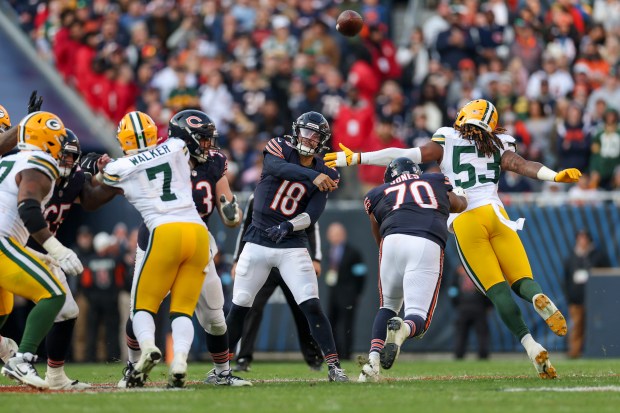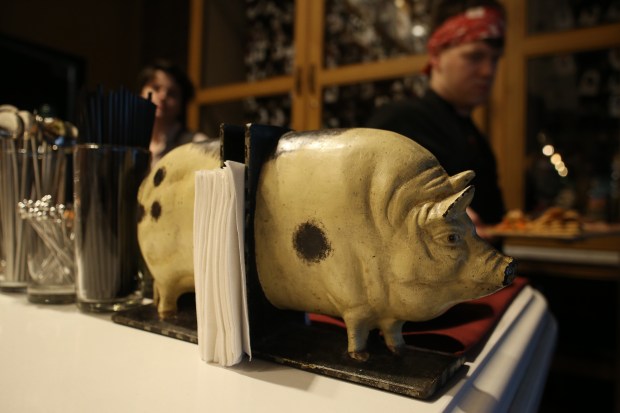The Chicago Bears seemed to be on the doorstep of a belief-building upset of the rival Green Bay Packers on Sunday. In the final minute, they had the ball in field goal range with a chance to snap their three-game losing skid. But on the final play, Cairo Santos’ 46-yard field goal attempt was blocked by Packers defensive lineman Karl Brooks.
Poof!
Just like that, an entire team’s optimism and energy turned into dejection and disbelief. The losing streak reached four games. And just to add to the poetic anguish of the whole thing, Brooks told reporters after the game that he blocked the kick with his left middle finger.
So, yeah. If you are scoring at home, the Bears’ latest wretched loss included a middle finger from the Packers. Because of course.
Now, as players and coaches again try to pick up the pieces at Halas Hall, Tribune writers Dan Wiederer and Colleen Kane talk through four key issues in true-or-false format.
True or false? With his clutch play late in Sunday’s game, Caleb Williams should get credit for a game-winning drive.
Dan Wiederer: False. You know me well enough by now to know I don’t do asterisks. Nope. No, thank you. Not in this demanding and unforgiving league.
Much of Chicago spent three years trying to reward Justin Fields for “close enough” achievements in game-on-the-line situations. And if I had to hear one more argument about how Fields should have been exalted and credited for winning moments had it only not been for Equanimeous St. Brown’s fourth-and-10 drop against Miami in 2022 or Ihmir Smith-Marsette’s fumble that same season in Minneapolis or Darnell Mooney’s bobbled and dropped Hail Mary in Cleveland last December, I might have lost it.
So no. No asterisks allowed. Success in the NFL is often binary. You either win or you lose. And the Bears lost Sunday when their game-deciding 46-yard field goal attempt was blocked.
Now, that wasn’t the fault of Caleb Williams, who was brilliant on the final drive. He had a pair of clutch completions to Rome Odunze and another to Keenan Allen. Pair that late-game magic with the way Williams rose up in the fourth quarter of the Bears’ Week 8 Hail Mary loss in Washington and you have evidence that the Bears’ young quarterback has “it,” that clutch gene, that defining moment hunger and focus that should allow him to excel in many, many more late-game moments like he did Sunday. I’ll sing Williams’ praises all week for how he handled himself and drove the offense on his final possession against the Packers. But I’m not giving him sort-of-credit for a game-winning drive.
Colleen Kane: Absolutely, the Bears didn’t win, so there can be no credit given for a winning drive.
But I do agree that Williams — and Bears leaders — can draw positives from the way Williams played in those last series against the Commanders and Packers. Especially on Sunday, for Williams to get sacked on first and second down, and then come back on third-and-19 and fourth-and-3 to make those throws to Odunze, it has to be confidence-building for everyone on offense.
I thought Cole Kmet’s take on it after the game was interesting when he talked about Williams finding a balance between doing the small things necessary to win games, such as running a smooth operation and taking easy completions — and then turning on game-saving mode when needed.
“He doesn’t have to be the No. 1 overall pick all the time,” Kmet said. “When the moment calls for it, we need that. At the end of the game. You take two sacks to start a drive, OK, now the No. 1 pick has to come out. That came out and it showed itself. So that was cool to see.”
So the Bears might have a quarterback who can win in the fourth quarter. But plot twist: they don’t have a team — or perhaps a coach — that can help him secure the victories. It’s enough to make a longtime Bears observer go insane, if you think about it hard enough.
And that brings us to the next topic.
True or false? Matt Eberflus’ decision not to shorten Cairo Santos’ game-deciding field-goal attempt was questionable.
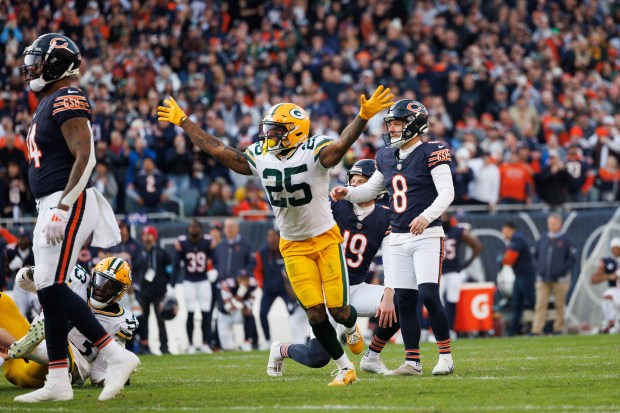
Kane: True.
As we’ve mentioned before when it comes to Eberflus’ failed decisions, it’s always fair to question them, especially ones with such dire consequences. I don’t think the Bears offense had shown anything to that point in the game to question their ability to gain a couple of extra yards for Santos. They had protected the ball well and moved it well too.
I don’t know if those extra yards would have made a difference in keeping the Packers from blocking the field goal, but it certainly makes you wonder when you hear Green Bay players saying they knew Santos had kicked some low balls from longer distances.
On the other hand, this one feels less egregious than the way Eberflus chose to defend the final series against the Washington Commanders or his failure to call a timeout when Tyrique Stevenson wasn’t in position on the Hail Mary.
It was understandable to trust that Santos could make a 46-yarder. Santos has been incredibly reliable in his Bears career, was 14-for-16 on field goals this season entering that moment and had made kicks from 53 and 27 yards earlier in the game. On Monday, Eberflus also mentioned a false start or holding penalty as a potential risk with running another play, a concern that maybe feels a little more valid than a fumble given some of the Bears’ issues with penalties this year.
Still, it’s just another Eberflus in-game decision we’re left to ponder.
Another gut-wrenching defeat to the Green Bay Packers: Brad Biggs’ 10 thoughts on the Chicago Bears
Wiederer: Let’s be clear: “less egregious than the Hail Mary loss” is a fairly low bar. So it’s no wonder Eberflus continues to take shots for how he handled Sunday’s final minute. On Sunday, Eberflus mentioned the fear of a fumble as one of his primary concerns for not trying to push the Bears closer for a shorter Santos field goal attempt. Yet as of today, the Bears offense has run 664 plays this season and lost just two fumbles. One came on the ill-fated handoff to Doug Kramer in Washington. The other was a strip sack in the fourth quarter in Indianapolis in Week 3. So …
And while I am reluctant to perform these types of comparative exercises frequently, watching the end of Sunday’s Bengals-Chargers game was eye-opening. The Chargers, after working inside Cameron Dicker’s kick line on the final possession, chose to run the ball with 26 seconds left from the Cincinnati 29-yard line. The result? Dicker wasn’t needed.
Running back J.K. Dobbins went all the way to the end zone for a winning touchdown. (Bengals kicker Evan McPherson, for what it’s worth, had missed potential go-ahead field goal attempts of 48 and 53 yards before that.)
Additionally, before the Bengals game-tying Hail Mary attempt, Chargers coach Jim Harbaugh used a timeout to get his defense properly set up and then sent five rushers to hurry Joe Burrow’s throw. The Chargers finished with a huge win, the kind the Bears have been so desperately searching for since leaving London more than a month ago.
True or false? Bears players may not be able to take much more of this type of losing misery.
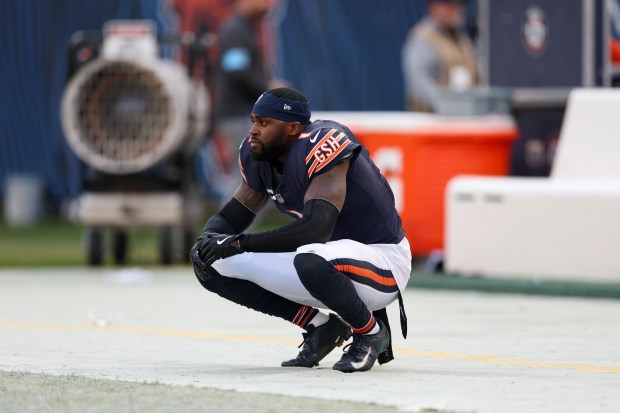
Wiederer: True. It’s one thing for a team to lose four consecutive games. That will always hurt, regardless of circumstances. But for the Bears to suffer two shocking last-second defeats in games they should have won but didn’t because the opponent was sharper when it mattered most? Well, yeah. That leaves a mark.
Thus it was easy to understand why Bears players were so despondent in the Soldier Field locker room Sunday. Speaking in a hushed tone, defensive end Montez Sweat couldn’t hide his dejection.
“It’s been a crazy year,” Sweat said. “A couple of these things that have been happening this year have never happened to me in my career. That it’s happening multiple times within a year is kind of crazy. I don’t really know how to describe it.”
Cornerback Jaylon Johnson called the Bears’ second stunning final-play loss “almost comical.”
All this misery is cumulative. It really is. And it’s human nature for these kinds of setbacks to take their toll — even on the most united and strong-willed teams. Instead of being right in the middle of the playoff picture, the 4-6 Bears are now three games out of third place in their division.
According to PlayoffStatus.com, the Bears now have just a 1 percent chance of making the postseason. With seven weeks left. A once-hopeful season seems destined to become the Bears’ seventh last-place finish in the past 11 years.
Man, that escalated quickly, didn’t it?
Column: The cruelty of the Chicago Bears’ losing skid is reaching new levels. Make it make sense.
Kane: I thought you could really sense the pain from players who had been a part of the Packers rivalry for a long time, such as Kmet and Johnson. They’ve been around since 2020, and their desire to finally get a win in the series felt real in the week leading up to the game.
Now they have to pick up the pieces again. Players keep saying the right things about staying together and focused through the remaining seven games. But I do think such crazy losses can wear a team down.
The one thing I think was different about this one is that there was a genuine glimmer of hope in the Bears offense. Even safety Kevin Byard used it as a carrot to keep the Bears moving on Monday.
“Obviously as we’re watching the offense and Caleb make strides, we can get this thing turned around and we can just keep getting better,” he said.
But there are some big challenges ahead for the Bears to keep that motivation.
True or false? Thomas Brown’s first week as offensive coordinator was promising.
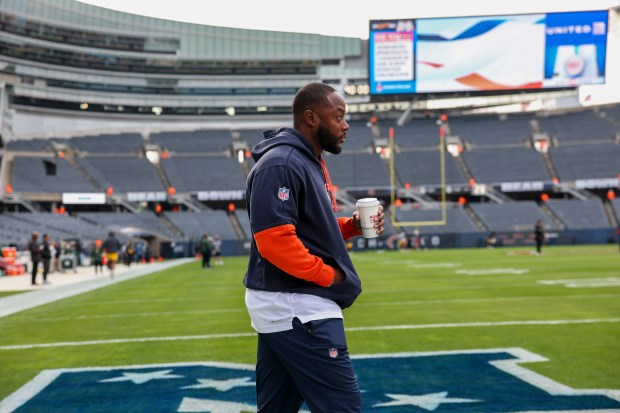
Kane: True.
When Eberflus was asked last week how much Brown could affect the offense in just a few days on the job after replacing Shane Waldron, the coach responded “significantly.” And I think that ended up being true Sunday for the way the game plan helped quarterback Caleb Williams.
The proof was in the results. It was in the way Williams looked. And it was in the way the players talked about the effect Brown had on them in the last week.
The Bears had 391 yards of offense. Williams threw for 231 yards and ran for 70. The offense was balanced, both from a run-pass standpoint and when looking at the even distribution to the Bears playmakers. And the Bears were 9-for-16 on third down and 3-for-3 on fourth down.
Afterward, players complimented Brown’s focused and detailed approach to the week of practice. They talked about how Brown got the offense into a rhythm early. And Williams and Kmet said the play-calling operation was much smoother in terms of the tempo with which Williams was getting the plays.
It’s one game, and Bears opponents are going to start to get a better idea about what Brown wants to do with the offense the more the Bears play. That’s going to make it more challenging. But for now, Williams and the Bears offensive players should feel better about what they accomplished Sunday compared to the last few weeks.
Wiederer: For the offense, Sunday was definitely some much-needed relief. And given the funk the offense had been in during losses to the Arizona Cardinals and New England Patriots, the flow of Sunday’s performance was encouraging. (After going 25 consecutive drives without a touchdown, the Bears actually strung together three consecutive scoring drives Sunday, including two TD marches.)
Brown deserves credit for catalyzing the turnaround and for earning his players’ belief and trust so quickly.
Still, this was just one game. It’s a very small sample size. And it’s important to not get overjoyed with a modest 19-point output in a loss — especially with the challenges that are coming from the Minnesota Vikings and Detroit Lions over a five-day span.
It’s also worth noting that Brown’s best day as a play-caller with the Carolina Panthers last season came against the Packers, a 393-yard, 30-point output in a narrow loss in Week 16. The next two weeks? The Panthers didn’t score, becoming the first NFL team in 15 seasons to get shut out in back-to-back games. Do with that what you will.
Overall, Brown had his unit ready to go against the Packers and the production should revive the offense’s confidence. But the Bears are still at the base of a pretty steep mountain as they look to accelerate their climb.


